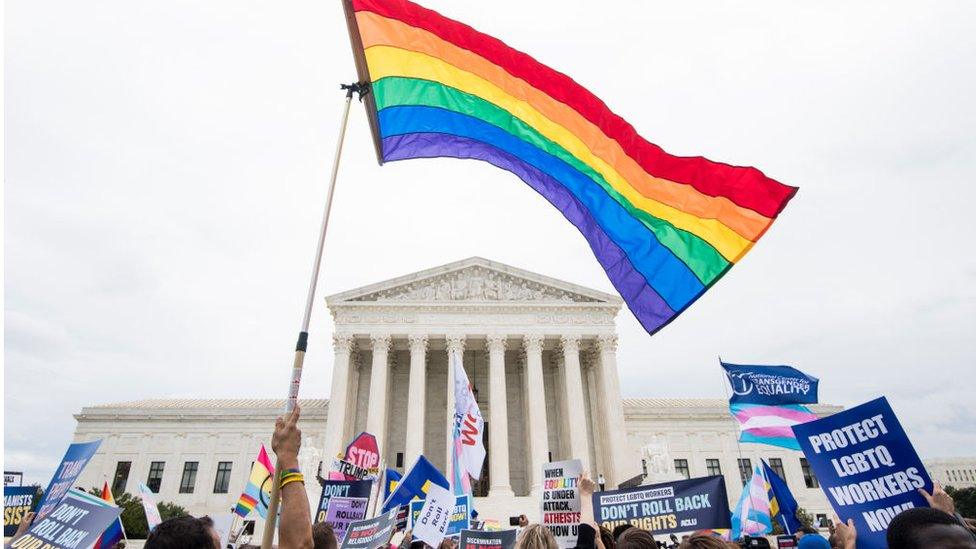The black transgender push to keep the fight alive at LGBT Pride
- Published
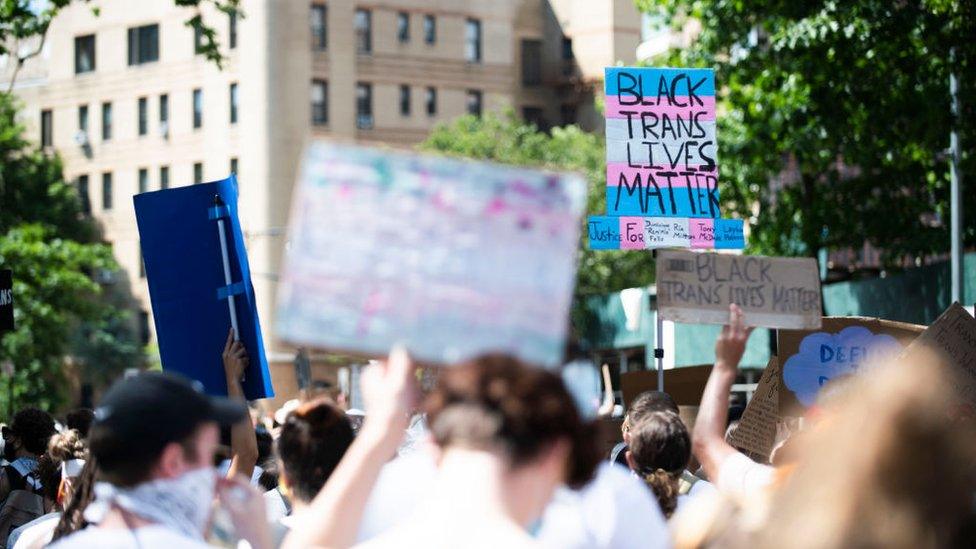
Pride Month has become more of a celebration of LGBT progress than a protest against the inequalities that remain, say protesters who have taken the streets in New York to call for more support for black transgender Americans.
Looking out at a sea of protesters dressed in all white, Raquel Willis led the crowd in a chant of "I believe in black trans power."
Nearly 15,000 people echoed her words in response.
While Covid-19 cancelled the city's 50th Pride Month parade, and put most smaller commemorations on hold, the large crowd at Brooklyn Liberation shows that the race reckoning that continues in the US has also extended to the LGBT community.
"We have been told to be silent for too long," said Willis, a black trans activist and writer, as the crowd cheered back in approval.
"Let today be the last day that you ever doubt black trans power."
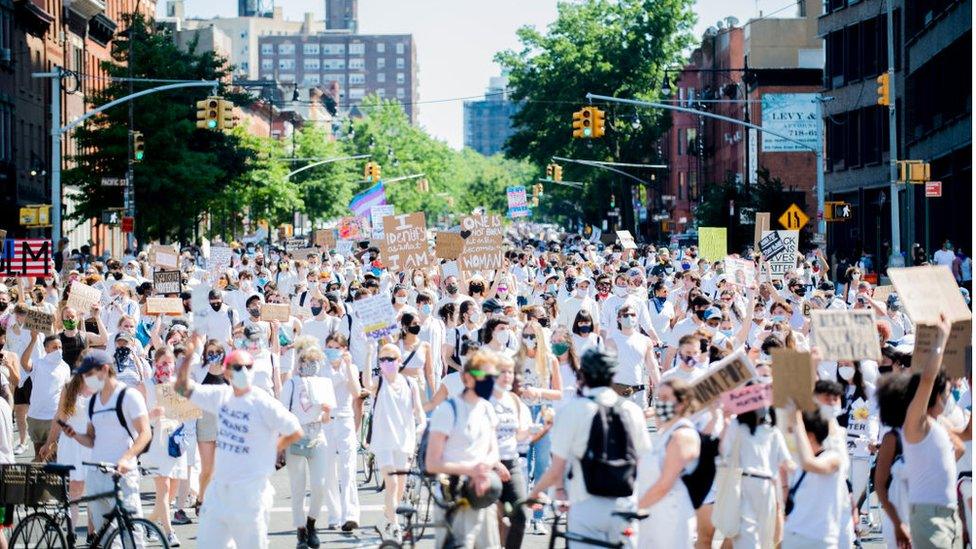
About 15,000 people attended the Black Trans Lives Matter protest in Brooklyn
Brooklyn Liberation took place in lieu of Brooklyn Pride this year, and for Fran Tirado, a writer and co-organiser of the demonstration, Pride should be dismantled.
Tirado, who is gender non-conforming, says minority trans people do not have their voices heard within the LGBT rights movement.
While George Floyd's death at the hands of the Minneapolis police, catalysed a series of community actions that spread through the world with unprecedented velocity, the names of the black trans people who have been shot or fatally injured by the police or civilians have not galvanised movements or garnered the same attention from the public.
For many black LGBT activists, the death of Tony McDade, 38, a black trans man shot by police in Tallahassee, Florida, has been woefully under-investigated. "We need to interrogate who we deem a worthy victim," Willis tells BBC News.
And McDade is not the only one being mourned.
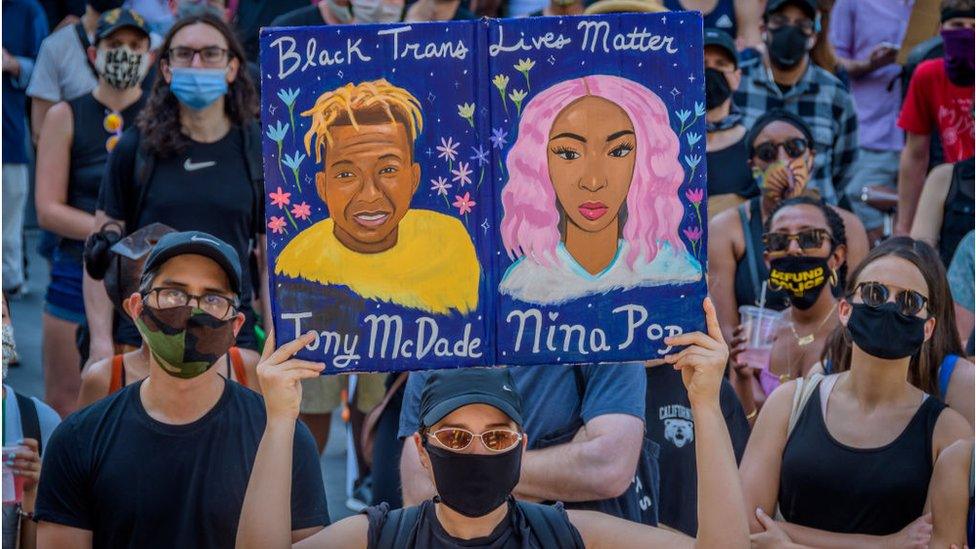
The unsolved killings of Nina Pop, 28, in Missouri, Dominque "Rem'mie" Fells, 27, in Philadelphia, and Riah Milton, 25, in Cincinnati over the past month, add up to least 12 trans women murdered in 2020 alone. Last year, the American Medical Association (AMA) declared the killings of 26 transgender and gender non-conforming people (the majority of whom were trans women of colour) an "epidemic".
"I don't know if we are served by the notion that Pride is a party," says Willis.
"It's not just about public displays of affection and fabulousness."
Trans activists of colour like Marsha P Johnson and Sylvia Rivera were at the forefront of the LGBT movement in its early days, since the Stonewall Riots of 1969. But their roles as organisers were quickly erased, says Michael Bronski, a professor of media and activism at Harvard University. "It became a predominantly white, middle-class cisgender movement," he says.
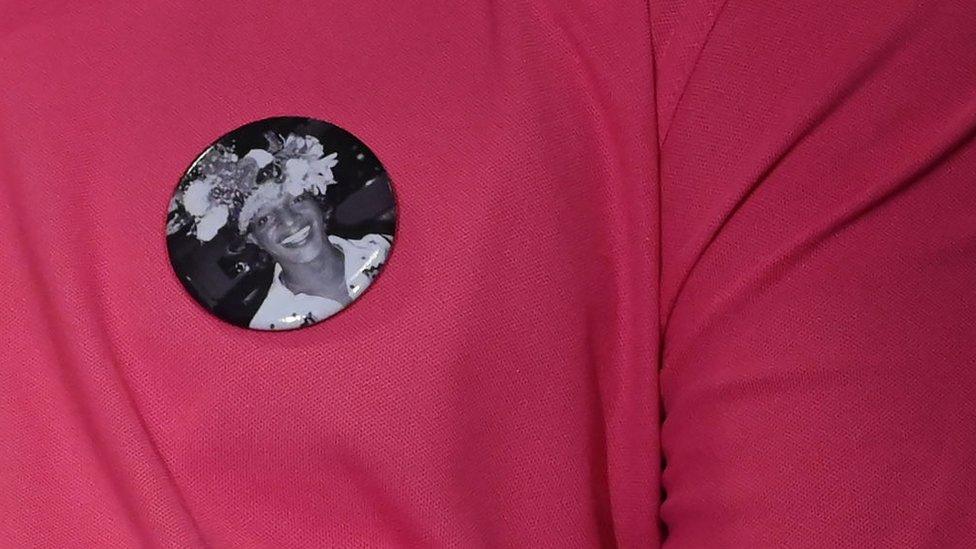
Marsha P Johnson was a pioneering activist
The movement shifted its focus from grassroots, protest activism to anti-discrimination legislation, with the struggle ultimately culminating in landmark rulings ranging from the repeal of Anti-Sodomy Laws (2003) to Marriage Equality (2015).
But this reformist agenda, Bronski notes, is at odds with the original aims of LGBT activists. Their original fight "wasn't about assimilation, it was about resistance", he tells the BBC.
Subsequently, modern-day Pride is now seen by many LGBT activists of colour as a whitewashed celebration of pivotal events.
Its current manifestation has come under intense scrutiny in recent years for being both too commercialised and overly reliant on police presence. It has ultimately shifted from a protest for change, to a celebration of LGBT progress, and in doing so it has sidelined the most marginalised within the community, say its critics.
For Asanni York, 25, this sentiment is now more pertinent than ever. York is the founder of For The Gworls - a black trans collective that raises money for gender-affirming surgery and living costs - and recalls how myopic Pride has felt in years past.
"You throw a bunch of rainbows, and drunk people at a parade and you think that's celebrating progress," York says. "But somewhere a black trans woman is being murdered."
It is easy to get distracted by legislation, and to ignore the work that still needs to be done within the queer community, says York. "White people will be getting married, and black and brown folks will be getting killed."
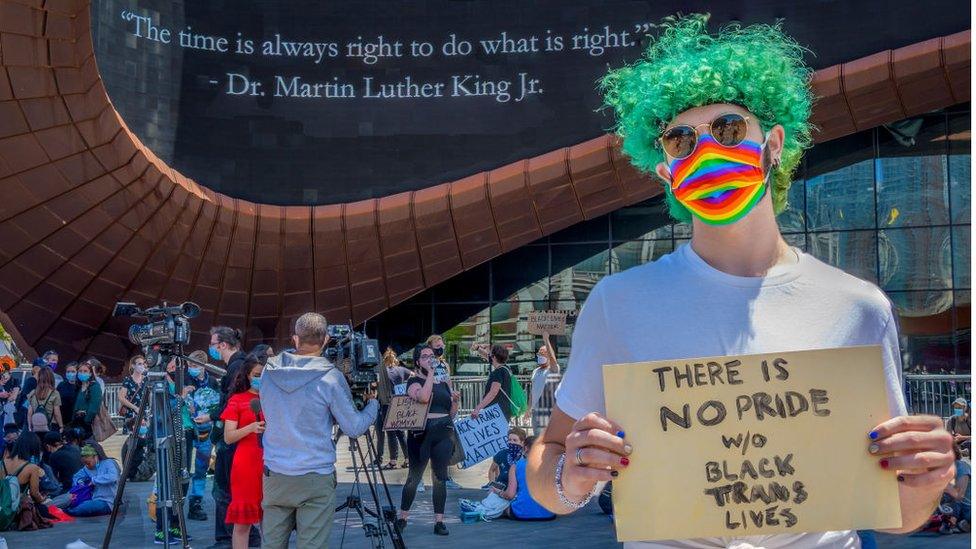
For York, this means not simply celebrating how far the movement has come, but instead examining how far it has to go. Black trans people in particular navigate the ever-present threat of assault or harassment by simply "taking a cab, or going to a restaurant... Particularly if they are not cis passing," they say.
And this discrimination also extends to the dating world, according to York. They cite cisgender gay men not wanting to date trans men and the routine fetishisation of trans women, as examples of "transphobic dating preferences."
Many would disagree that such dating preferences can be described as transphobic, and say same-sex attraction is not related to gender. When asked for their view on these dating issues, leading LGBT advocacy group GLAAD told the BBC that they echo the "leading advocacy, medical, political, and psychological organizations that assert trans women are women".
Although Pride Month in 2020 has seen legislative victories like the Supreme Court protecting LGBT workers from job discrimination, these milestones are overshadowed by the fear of legislation yet to come.
Just prior to the Supreme Court ruling, President Trump announced plans to remove discrimination protections for transgender people with regard to healthcare and health insurance.
A taxi service trying to keep trans people safe
"We can't just be reactive," York says. "The momentum needs to go beyond one month."
This year, For The Gworls was a beneficiary of Brooklyn Liberation, and will also be supported through a series of virtual Pride concerts throughout the month.
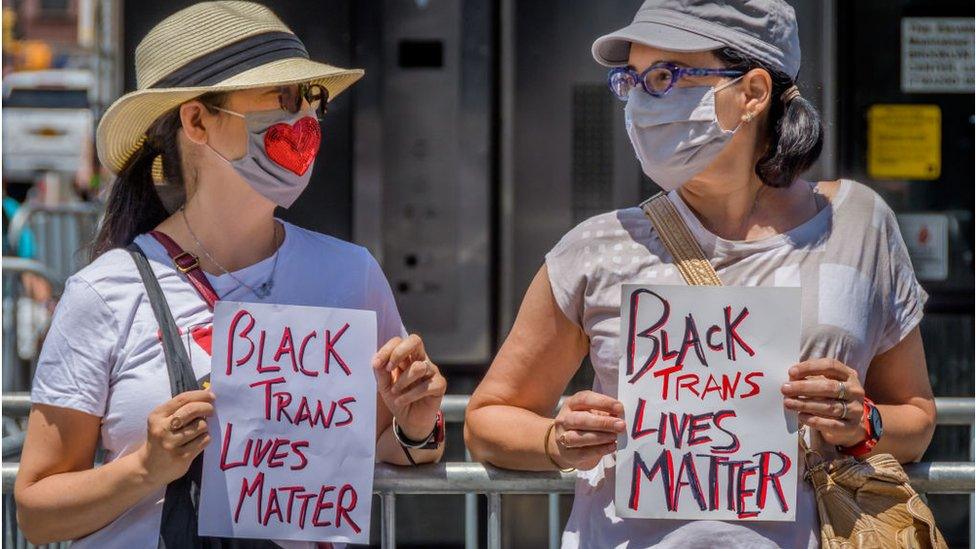
As the the LGBT community leans into this moment of introspection, activists like York and Willis have highlighted the need to centre black trans and gender non-conforming voices going forward - both financially and in the leadership of LGBT non-profit organisations.
For the organisers of Brooklyn Liberation - the majority of whom are trans women of colour - the June rally served as a template for what future Prides might look like.
"It felt so grounded in what the early organisers [of Stonewall] had envisaged," said Ianne Fields-Stewart, a co-organiser, actress and founder of The Okra Project - an initiative which works to combat food insecurity among the black trans and gender-non conforming community.
Those present at Brooklyn Liberation were encouraged to wear all white - a nod to the NAACP 1917 Silent Protest Parade. Organisers did not consult with the police, and there was no corporate sponsorship. It was an attempt to "throw away a lot of what Pride has become," Tirado says.
This year, police presence has been re-evaluated in other cities for Pride month. In Toronto, organisers announced in January, that they would ban police in uniform from marching.
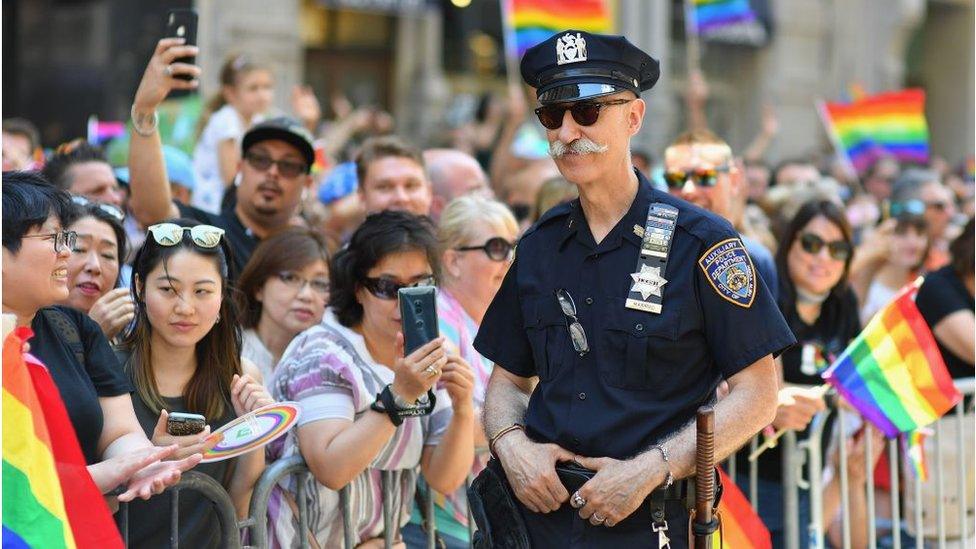
A police officer at the 2019 Pride March
In many ways the Covid-19 pandemic has fostered activism from the comfort of people's homes, according to Fields-Stewart. "This moment provides us with more access to each other," she says.
While protests across the country have kick-started overdue conversations, Fields-Stewart is aware that while there is currently energy for the cause [for trans rights], it can easily wane. It is now the job of allies to stoke the fire of resistance before it dwindles to embers.
"I am trans, and therefore I didn't create transphobia," she says. "It is the responsibility of people to be angry enough and feel complicit enough to want to do something about it in the world around them."
Clarification and update 6th July 2020: An earlier version of this article cited cisgender gay men not wanting to date trans men as an example of transphobic preferences in the dating world. However some readers took this to be a statement of fact, rather than the view of Asanni York, and so these comments were removed. They have since been re-added, in context, along with some additional reaction from LGBT advocacy group GLAAD.
- Published15 June 2020
